June 22, 1941. An unexpected war at dawn
The following abbreviations are used in the article: IN - military district, GU - Headquarters, GSh - General base, SOBOVO - Western Special VO, Spacecraft - Red Army, CBF - Red Banner Baltic Fleet, Cova - Kiev Special VO, NCOs - People's Commissariat of Defense, Og - operational readiness, OdVO - Odessa VO, PV - border troops, Software - border detachment, Pribovo - Baltic special VO, Goals Difference - intelligence materials, sd - rifle division, BSF - Black Sea Fleet.
In the previous part we examined the events that took place on the eve of the war in the People's Commissariats of Defense and the Navy.
After 20:00 on June 21, the RM came to Stalin about the possible start of the war on the coming night.
By 20:50 he summons the People's Commissar of Defense, the Chief of the General Staff and the 1st Deputy People's Commissar of Defense S.M.Budyonny. The message about the possible start of the war on the night of June 22, S. K. Timoshenko and G. K. Zhukov did not worry.
After the departure of Marshal Budyonny, the People's Commissar of Defense and the Chief of the General Staff were probably able to dispel Stalin's doubts about the German attack on June 22. These persons were sure that the German shock groups were still absent from the territory of East Prussia and the General Government.
Available tank regiments and divisions, according to intelligence, were distributed along the entire Soviet-German border. Therefore, in their opinion, there was nothing to fear ...
SK Timoshenko and GK Zhukov by 22:25 return to their NGOs. The People's Commissar of Defense spoke with his deputy K.A.Meretskov and sent him to the Leningrad Military District.
After that, Tymoshenko, Zhukov and a group of generals from the Operations Directorate draw up the text of Directive No. 1. At the same time, the People's Commissar calls five border districts, warning the leadership of possible provocations at the border. At the same time, he does not say a word about the content of the forthcoming directive.
Admiral V.A.Alafuzov at about 23:20 hears from Tymoshenko that "The People's Commissar doubts the attack of the Germans." This indicates that the SC leadership does not expect a full-scale war on June 22. Not believing in the beginning of the war, the People's Commissar of Defense and the Chief of the General Staff, until the decryption of the directive in the districts, will not say a word on the phone about the content of Directive No. 1 ...
After 23:35, General Malandin revises the prepared text of the directive.
At 0:30 on June 22, the directive was sent to the districts.
Since Directive No. 1 does not contain instructions on the withdrawal of covering armies at positions to the border, the command of the districts is forced to act for their own reasons.
The chief of staff of the OdVO before decoding the directive gives instructions on redeployment aviation, on the withdrawal of part of the troops to the border, and the remaining garrisons (or part of them) are raised on a training alert. After reading Directive No. 1, M.V. Zakharov understands that what he gave: "The order to withdraw the troops of the district to the cover areas on the state border was in conflict with the instructions received."
From 3:30 to 4:00, enemy aviation strikes at stationary airfields in the district, but the bulk of the aircraft managed to relocate to field airfields.
The commander of the troops of KOVO acts in strict accordance with the requirements of Directive No. 1 and, among others, gives instructions: "Do not bring field troops to the border."
In ZapOVO, General DG Pavlov orders all units to be put on alert, to take pillboxes and positions on the border, to relocate air regiments to field airfields.
In PribOVO, instructions are given on the covert occupation of the main defense zone, on the immediate installation of mines and subtle obstacles, on the redeployment of aviation to field airfields.
N. M. Khlebnikov (Chief of Artillery of the 27th Army of the PribOVO):
Having received a scolding from Moscow for facilitating the evacuation of family members of servicemen, the PribOVO Military Council inserted a special paragraph into its directive:
In the Leningrad Military District, they operate in accordance with the instructions of the directive: the units are on alert at the points of permanent deployment, the aviation is dispersed.
Unfortunately, in PribOVO, ZAPOVO and KOVO, they did not have time to fully implement the instructions given from the VO headquarters before the Nazis attacked, because of directives that came late to each of the districts ...
In the People's Commissariat of the Navy fleets and the fleets were instructed to switch to exhaust gas No. 1, but the transition to a new level of readiness is not carried out quickly.
For example, the flagship of the Black Sea Fleet battleship Parizhskaya Kommuna switched to OG No. 1 at 4:49 am.
The instruction on the transition to full combat readiness was not conveyed to the fleets from the People's Commissariat. Therefore, the commander of the Black Sea Fleet did not dare to give the order to open fire on enemy aircraft. The permission to open fire on enemy aircraft was not communicated to air defense units and ships of naval bases, at least in Kronstadt and in Liepaja.
At 1:10, 14 German bombers took off from Konigsberg, and at 3:05 they began laying mines near Kronstadt.
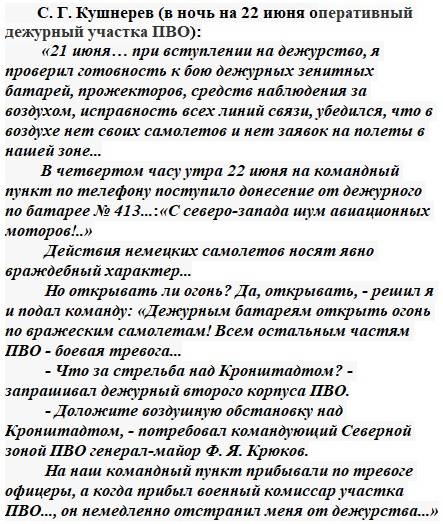
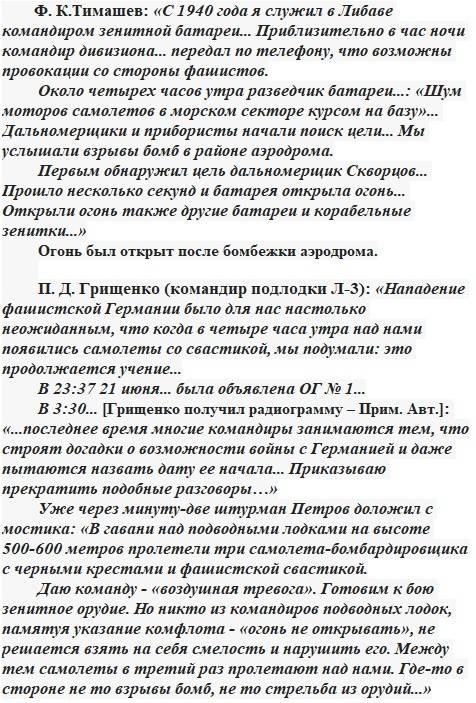
Border troops of the NKVD of the USSR
We will begin the next part of the article by examining the events that took place in the PW of the western districts on the eve of the war.
One of the writers wrote: "All border troops ... were brought to full combat readiness at 21:30 on 21.06.41."... This version is very common.
It turns out that non-profit organizations do not expect a war at dawn on June 22, but L.P. Beria is expecting it.
Let's check if it was really so.
On June 20, the PO of the Belarusian and Ukrainian border districts (the author did not find a similar order for the Moldavian border district) received an order to stop scheduled classes, to cancel weekends, to strengthen border security at night.
However, on the night of June 22, the order to take up defensive positions at the outposts was not given. The border guards had to take positions under fire, and how many of them died without firing a single shot at the enemy is unknown ...
In the book "Russian Border Troops in Wars and Armed Conflicts of the XNUMXth Century." it says:
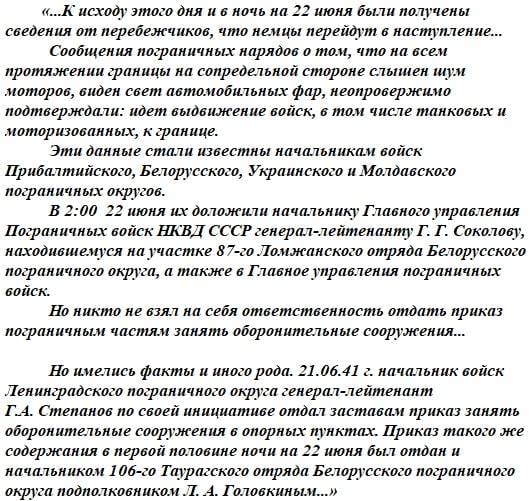
In the Leningrad border district, the decision to prepare to repel an attack also had to be made independently by the head of the 5th Red Banner PO A. M. Andreev:
a) German-Finnish troops are completing the concentration of the operational offensive group. The most probable directions of the main blows: Imatra, Hitola, Kexholm; Lappeenranta, Vyborg, that is, in the zone of our 5th border Red Banner detachment. In the neighbor's lane on the right: in the direction of Lahdenpohja, Sortavala;
b) the enemy is most likely to go over to the offensive in the next few hours;
c) we know that according to the cover plan for the Enso line, the Vuoksi River, units of the 115th rifle division are to be moved ...
On the morning of June 21, the command of the 115th SD informed us: "We have instructions to be in full combat readiness in places of permanent deployment ..."
The head of PO Andreev issued an order to take up combat positions in the outposts, to withdraw families of servicemen to the rear on vehicles and other instructions.
On the eve of the war, alarming messages were constantly coming from the western border to Moscow.
Probably, especially a lot of them came from the Belorussian border district, which was headed by General I. A. Bogdanov.
The Belarusian border district guarded the land border on the territory of the ZapOVO and PribOVO. One of these messages could also include the report of the commander of the 43rd air division, G.N. Zakharov, who flew along the border at the direction of the commander of the ZAPOVO Air Force.
The RM from the western border reached the People's Commissar of Internal Affairs, who was forced to send excerpts from these messages to the Politburo of the Central Committee of the All-Union Communist Party of Bolsheviks, to the Government and to NGOs. In response, L.P. Beria could receive a scolding from these institutions for panic. This is probably why on June 20 or 21, the head of the Main Directorate of the NKVD of the USSR GG Sokolov with a group of commanders is sent to the Belarusian Border District for an inspection.
From a telephone message sent from Bialystok at 10:45 am on June 22, the route of movement of Generals Sokolov and Bogdanov is known: "Sokolov and Bogdanov left Lomzha, Avgustov, Bialystok, Vilno, we have no connection with them ...".
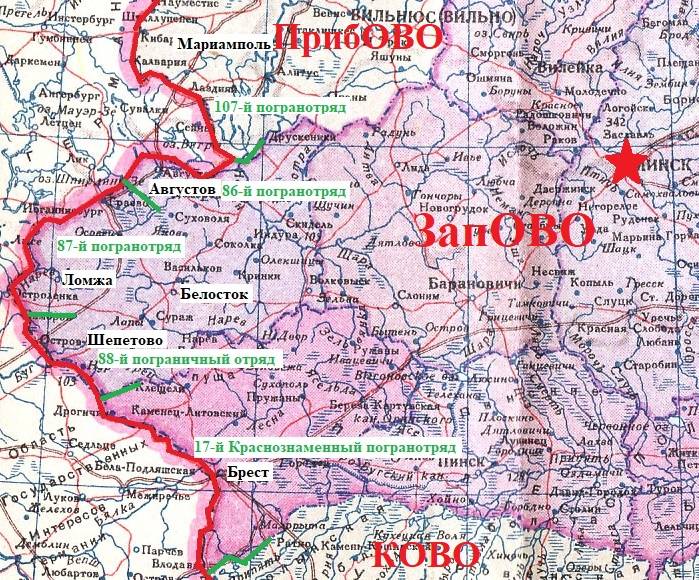
First, generals Sokolov and Bogdanov left for Lomza (87th PO) and on June 22 were supposed to arrive at the 86th August PO. Somewhere on June 23, they were going to return to Bialystok, probably for a report to Moscow. Further, their path ran to the Baltic States.
Thus, both generals did not expect the start of the war on June 22.
Why was Lomza the first point?
On the section of the border controlled by the 87th RO, on June 14, two saboteurs were detained, who told about the expected crossing of the border by a large detachment of up to 20 people in the period from June 15 to 22.
On the night of June 17-18, a group of 8 people crossed the border at the section of the same detachment. During the arrest, some of the violators died, and some were captured.
On the night of June 19, a group of 87 people again crossed the border in the area of responsibility of the 12th PO. This group was also partially destroyed and partially captured. The detained violators showed that on June 22 Germany would attack the USSR.
A group of four saboteurs was detained on the territory of the neighboring 86th PO on June 10-12.
On the night of June 19, the detachment began to receive information about the regrouping of German troops near the state border in the Augustow Forest and against Grajewo (on the border of the zones of responsibility of the 86th and 87th PO).
Therefore, the route of the generals lay through Lomza to Augustow.
Since the head of the GU PV did not go to the Brest PO, it can be assumed that fewer alarming messages were received from this section of the border. But in this sector the concentration of the 2nd tank group was taking place, which was not known at the headquarters of the 4th Army, ZAPOVO and in the General Staff ...
From the book “Border Guards of Belarus. June 1941 - August 1944 "(From the description of the combat operations of border guards of the 87th PO on the border in the first days of the war. 1.02.43):
The current situation was reported to the head of the USSR PVD, Lieutenant-General Sokolov, to the head of the VP of the BSSR, Lieutenant-General Bogdanov, who had arrived at the detachment headquarters by that time, the commander of the 6th cavalry division, Major General Nikitin, neighbors on the right and left were informed ...
The former head of the 86th PO also wrote about the meeting with General G.G.Sokolov G.K. Zdorny:
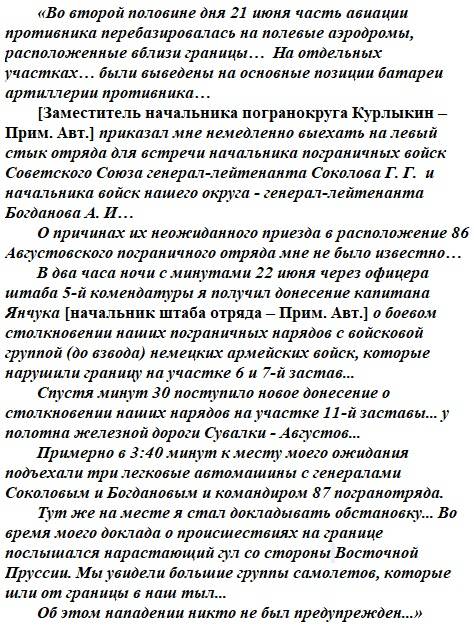
It turns out that neither the headquarters of the Belarusian border district, nor the GU PV did not expect the start of the war on June 22.
Therefore, neither Moscow nor the headquarters of the border districts were instructed to take up defensive positions at the outposts. And some of the buildings of the outposts were at a distance of several hundred meters from the border, and enemy artillery batteries were installed opposite them on June 21. That is why many of the buildings of the outposts were unexpectedly subjected to artillery or machine-gun fire.
Provocations on the border on the eve of the war took place constantly.
For example, on the night of June 98, on the night of June 20, artillery fired at the village of Opalin in the area of the XNUMXth PO. Also, German scouts cut out sections of telephone wires.
Therefore, it was difficult for the leadership of the border districts and GU PV to make a decision to bring the outposts into full combat readiness. After all, they needed to know for sure: there was a war ahead or some kind of sophisticated provocation.
The atmosphere was tense. Calls from the border districts to GU PV on the night of June 22 and before the start of the war had to follow quite often.
Since from June 21 to June 22, alarming messages were received from the border, L.P. Beria was at night in the People's Commissariat. S. Beria confirms that his father was not at home at that time.
At 23:45 on June 21
The message about the meeting with representatives of the German side was to be sent to the headquarters of the border district and then to Moscow.
A. Horhordin (Leningrad border district):
At 24 o'clock ... the prisoner reported ... 22.06.41 the Nazi troops will go over to the offensive ...
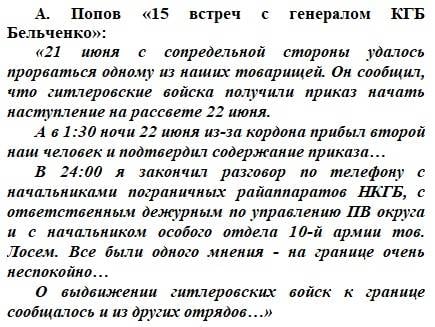
Chief of the 90th Border Detachment Major M. S. Bychkovsky:
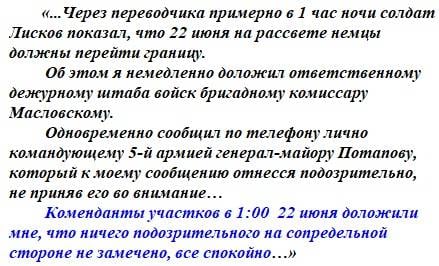
We see that at the same time messages were going up on the command, which indicated that at the border "everything is quiet".
Political report On the activities of 106 PO for the first month of the war (21.07.41):
The chief of the 86th PO GK Zdorny wrote about the clash of border patrols with a German military group after two in the morning. This message also had to go upstairs on command.
Telephonogram Directorate of the NKGB for the Lviv region in the NKGB of the Ukrainian SSR (3:10 June 22):
Everything that happened at the border had to be reported at the instance, and the messages came to the Main Directorate of the Pole, and then went to Beria.
Only on the basis of the posted documents and memoirs of veterans-border guards, placed in the books "Border troops of the USSR 1941-1945" and "Border guards of Belarus. June 1941 - August 1944 "one can say for sure: how many outposts were subjected to an unexpected blow, after which the surviving soldiers ran out of the buildings of the outposts and took up positions:
- 90th PO: 1, 5, 6, 8, 9, 11, 13, 14 outposts;
- the headquarters of the 92nd PO. At 4:00, a sudden heavy artillery fire was opened and communication was disrupted;
- 98th PO: 8 outpost, 5, 7, 8, 9, 10 outposts;
- 17th Red Banner PO: 1, 3, 4, 5, 6, 8, 9, 11, 12, 13, 15, 18 and 19 outposts;
- 86th PO: 5, 7, 11 and 20 outposts;
- 87th PO: 2, 14, 17 outposts and the 2nd commandant's office;
- 105th PO: 3, 15 outpost and outpost adjacent to it.
The 106th RP says that the outposts met attacks in the trenches, but, probably, the order did not reach everyone.
For example, the deputy commandant of the 3rd commandant's office of the 106th PO S. D. Pomyanin recalled: “At 3:40, three German planes flew over the outpost, followed by heavy artillery shelling at the outpost ... 42 personnel occupied the trenches ...”
From the book "Border Troops of the USSR 1941-1945" (recording of a conversation between the chief of staff of the PV of the Ukrainian SSR with the operational duty officer of the GU PV, 4:50):
They did not expect the outbreak of war on the border of the Moldavian border district (from the book "Border troops of the USSR 1941-1945"):
3rd commandant's office. With the outbreak of hostilities, all divisions of the commandant's office were put on alert ...
From the book “Border Guards of Belarus. June 1941 - August 1944 ":
1) At the beginning of the action, he was in the 86th border detachment.
2) At 4:20 am on 22.06.41, the outposts, as a result of concentrated artillery fire, took off into the air. The outposts' connection with the commandant's offices was immediately lost ...
It can be stated that the resting shift of border guards was taken by surprise in the premises of the outposts.
D. M. Miloslavsky (commander of the 5th department (reconnaissance) of the 1st Volchinskaya commandant's office of the 17th Red Banner PO):
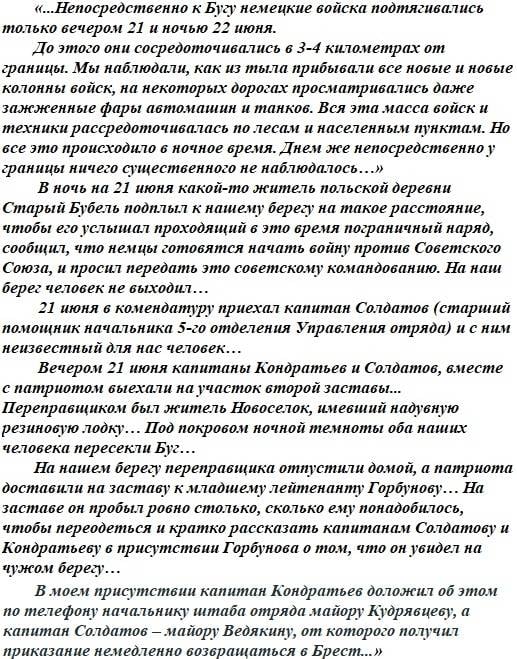
After the war, this event was investigated by S. N. Martyanov... Then this story was outlined in the book "Patrols Listen to Silence". The inhabitant of the village of Stary Bubel, who sailed to our shore, was P.K.Dudko, and the boatman was P. Shumer, a resident of the village of Novoselki. It seems that the crossing took place in the section of the 3rd outpost. Since a rubber boat abandoned somewhere on our shore could be associated with the illegal stay of Soviet citizens on the German side, they developed a special operation to "locate the boat" and pursue border violators. If only the western neighbors did not make claims ...
M. A. Paschenko (the commander of the machine-gun section of the 3rd outpost) recalled:
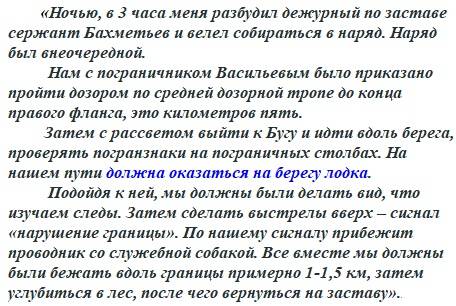
A. P. Kuznetsov (Head of the 17th Red Banner Border Detachment):
Starting from 2:00 - 2:20 am from all commandant's offices, and sometimes directly from the outposts, alarming reports began to come in about the withdrawal of tanks and the accumulation of fascist troops directly to the line of the state border.
Several more times we called the district headquarters. The answers are the same: “Reported to Moscow. Wait "...
It should be noted that an order has already been signed by the People's Commissar of Internal Affairs to dismiss Major A.P. Kuznetsov, chief of the PO, from his post. This is probably why A.P. Kuznetsov did not aggravate the situation and put the outposts on alert ...
Below are the memoirs of the chief of staff of the 41st SD, from which it is clear that the commandant of the 91st PO on the night of June 22 did not receive orders from the direct leadership. This is probably why he decided to get at least some indication from the headquarters of the division, the units of which were to move to the border during the attack.
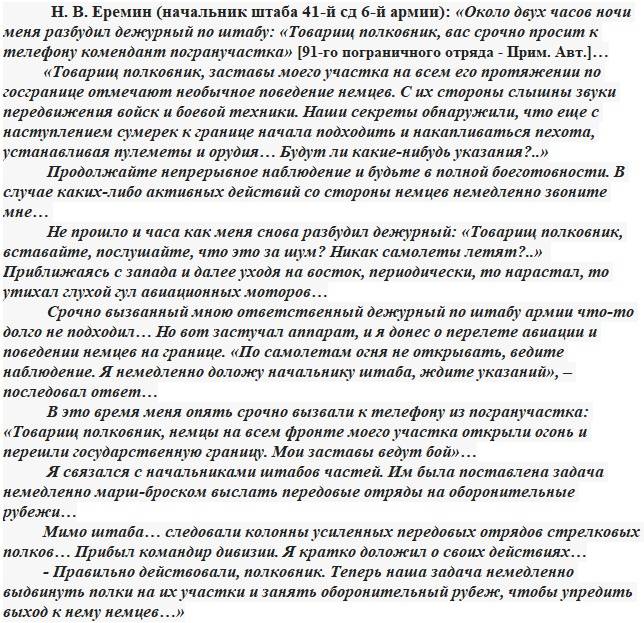
And at this time, the commander of the KOVO troops demanded not to withdraw the field troops to the border, but they did not manage to bring such an order to the chief of staff of the 41st Rifle Division ...
At the Main Directorate of PW from 4:15 am, reports of shelling at the border begin to arrive. At 4:55 am, a message arrives from Tallinn. Only at 5:30 am the Deputy People's Commissar (probably General Maslennikov) gives an answer to Tallinn. It is possible that before that, the deputy commissar for PV and internal troops reported the situation to Beria and received some order.
On the site "Border" a few more pages of the Operational Record Journal have been posted.
G.K. Zhukov's version
G.K. Zhukov wrote in his memoirs:
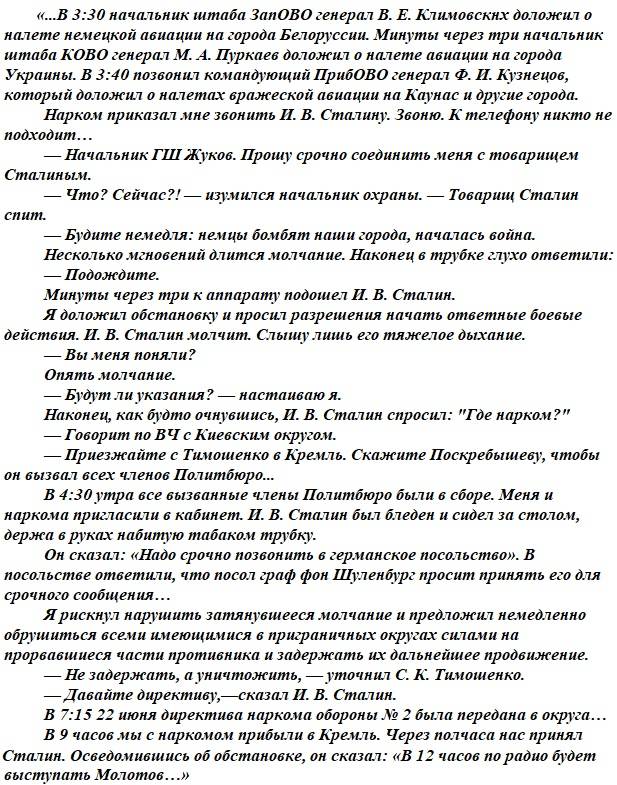
Currently published Operational summary General Staff No. 01 at 10:00 on June 22, signed by the Chief of the General Staff.
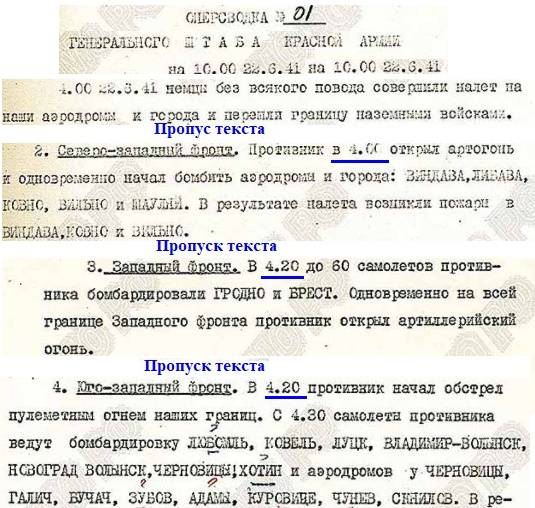
The summary indicates a later date for the shelling and raids of German aircraft than that given in the memoirs. It is unlikely that the persons indicated in the memoirs call the General Staff and give one time, and later indicate another in the official reports.
It seems that the time of the reports from VO has been shifted in order to justify the call to Stalin at 3:40. In non-profit organizations, the leaders do not sleep, and the leader, confident that there will be no attack, sleeps in the country ...
Information about the meeting of the spacecraft leadership with Stalin at 4:30 on June 22 has not been documented.
The record of the arrival of the spacecraft leaders again in the Kremlin at 9 o'clock also contradicts Stalin's visit log. We are faced with a distortion of the chronology of events in order to attribute the activity to the leadership of the spacecraft from 3:30 onwards. The main provisions from these memoirs later began to be perceived as the official version of events, which was included in many memoirs.
If there is a distortion of the chronology, then someone needed to hide something behind it ...
The version of the raid on Sevastopol
There are different versions of the June 22 raid of enemy aircraft on Sevastopol.
Some of them differ in little things, while others contradict each other.
The author does not intend to highlight the most reliable version. He just needs to tie some time stamps to the chronology of events in Moscow in the early morning of June 22.
From different versions of the raid, the author would single out the following events:
- at 2:35 a.m. the radar station detected an unknown aerial target coming from the west;
- at 3:07 am the Konstantinovsky post of the observation and communication service (SNiS) reported on the approach of an unknown aircraft;
- at 3:13 a twin-engine aircraft was found by searchlights-air defense searchlights of the main base;
- at 3:15 am the plane dropped two objects on the fairway by parachute;
- at 3:20 am from the posts of SNiS and air observation, warning and communication (VNOS) reports were received on the approach of aircraft to Sevastopol;
- at 3:45 a.m. the third plane appeared from the side of Cape Fiolent;
- at 3:48 a mine self-destructed, hitting a residential area;
- at 3:52 a mine self-destructed in the area of the monument to the sunken ships;
- at about 4: 00–4: 10 a fourth plane appeared over the main 6az.
Published documents of the Navy on the raid on Sevastopol are absent, and the memories of war veterans are contradictory.
The former chief of staff of the Black Sea Fleet, Admiral Eliseev, indicates the start time of the raid at 3:07. According to the author, this is true only for assessing the events after the start of the war. If it is not known whether the war will start or not, then this time is incorrect to consider the beginning of the raid.
Chief of Staff of the Red Banner Baltic Fleet, Admiral Panteleev, wrote:
But he was not even allowed to open warning fire.
It is unlikely that the People's Commissar of the Navy reported to Stalin by telephone on each flight of the German plane (s) over Hanko or Libau base.
People's Commissar N. G. Kuznetsov With reference to the commander of the Black Sea Fleet, he writes about the start of the raid at 3:15: “An air raid has been made on Sevastopol. Anti-aircraft artillery repels the attack of the aircraft. Several bombs fell on the city ... I look at my watch. 3:15 ... "
In memoirs G.K. Zhukovapublished in 1969 said:
I asked the admiral: "Your decision?"
- There is only one solution: to meet the planes with naval air defense fire.
After talking with S. K. Timoshenko, I replied to F. S. Oktyabrsky: "Take action and report to your People's Commissar" ...
Probably, Admiral Oktyabrsky called to understand what to do. After this call, he needed to report his actions to his People's Commissar.
After a letter from Admiral I. D. Eliseev to the press department of the Central Committee of the CPSU in April 1970 that the raid on Sevastopol began at 3:07 am, in the next edition of G.K. Zhukov's memoirs, the time of the raid was corrected from 3:17 am to 3 am: 07.
According to the chief of staff of the 61st anti-aircraft artillery regiment I. K. Semenova, at 3:13 from the headquarters of the Black Sea Fleet air defense there was an order to turn off the searchlight stations. Secondary floodlights were turned on at 3:15. In their light, it was seen how the plane dropped two objects on the fairway by parachutes (initially they were mistaken for paratroopers). The anti-aircraft artillery of the main base was silent and opened fire at 3:22.
I. I. Azarov (head of the department of the Main Political Directorate of the Navy, was in Sevastopol on a business trip): “Suddenly the silence was broken by artillery volleys. I automatically glanced at my watch: it was about half past four ... "
We have reviewed some of the sailors' memories of the raid, which differ in the timing of the opening of fire with anti-aircraft guns.
On the eve of the war, the 23rd separate border commandant's office was stationed in Sevastopol. Border guards were guarding the coast in this area. The 2nd Black Sea detachment of border ships was stationed in Balaklava, consisting of two divisions (8 boats of the MO type), which alternately patrolled the water area near the Crimean peninsula.
Probably, upon the opening of fire by anti-aircraft weapons of the fleet against enemy aircraft, the border guards could fix the time of the enemy's air raid on Sevastopol. In the reconnaissance report of the NKVD PV, the time of the raid is 3:20.
Back in Crimea, an NPO association was deployed - the 9th Separate Rifle Corps, the time of 3:20 was also noted in the combat log.
Data from the Headquarters of the Border Troops of the NKVD and the Black Sea Fleet.
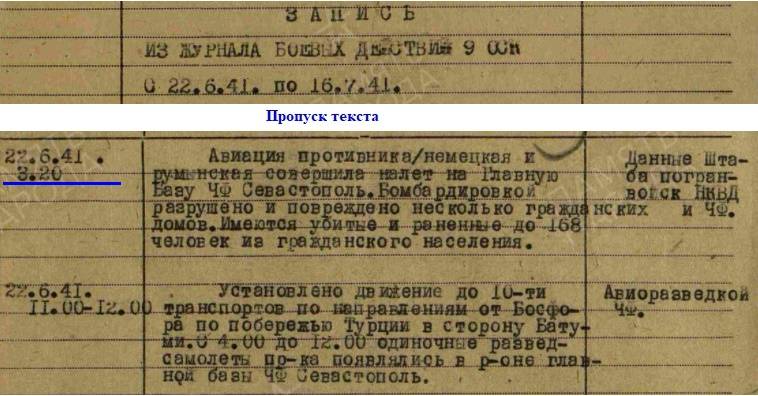
It can be seen that the data at the corps headquarters were obtained from two independent sources: from the border guards and from the Black Sea Fleet.
Therefore, we take the time of opening fire by anti-aircraft weapons - 3:20.
If fire on enemy aircraft was opened at 3:20 am, then Admiral FS Oktyabrsky's call to the NKO at 3:17 am is logical, where he was not given an unambiguous order to open fire on enemy aircraft. Therefore, the commander of the Black Sea Fleet also did not take responsibility for opening fire and ordered the officer on duty: "Follow the instructions".
He took responsibility for opening fire Chief of Staff of the Black Sea Fleet Admiral I. D. Eliseev.
After the opening of fire on them, Admiral Oktyabrsky was obliged to report the raid of enemy aircraft to his immediate superiors - the People's Commissar of the Navy. This talk could take place at 3: 20–3: 25.
Understanding the issue of the raid on Sevastopol, the People's Commissar of the Navy called G.M. Malenkov. Then N. G. Kuznetsov tries to get through to Stalin. According to the memoirs of FS Oktyabrsky, after a call to the People's Commissar of the Navy, he received a call about the raid on Sevastopol, Beria and Malenkov.
I. I. Azarov:
In an unusually harsh voice, Oktyabrsky said: "Yes, yes, they are bombing us ..."
There was a violent explosion, glass rattled in the windows.
“Only now, somewhere near the headquarters, a bomb has been dropped,” Oktyabrsky continued in an excited voice ...
“In Moscow, they don’t believe that Sevastopol is being bombed,” said Kulakov muffledly [Member of the Military Council of the Black Sea Fleet - Approx. auth.].
From the explosion, we can say that a conversation with one of the subscribers in Moscow took place at about 3: 48–3: 52. At this time, a subscriber in Moscow does not believe in the bombing of Sevastopol ...
People's Commissar of the Navy N. G. Kuznetsov:
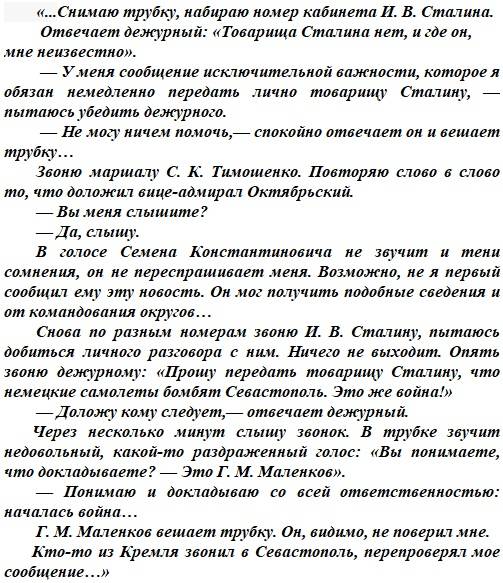
Events at the Foreign Ministry
Since June 21, the 1st Secretary of the Soviet Embassy in Berlin, VM Berezhkov, has been trying to arrange a meeting between the ambassador and the German foreign minister. The invariable answer is given that the officials of the German Foreign Ministry are unable to contact Ribbentrop.
Until four in the morning (Moscow time) on June 22, nothing changes.
After four o'clock, the embassy is informed that the meeting will take place at 4:30.
Erich Franz Sommer (employee of the German Foreign Ministry):
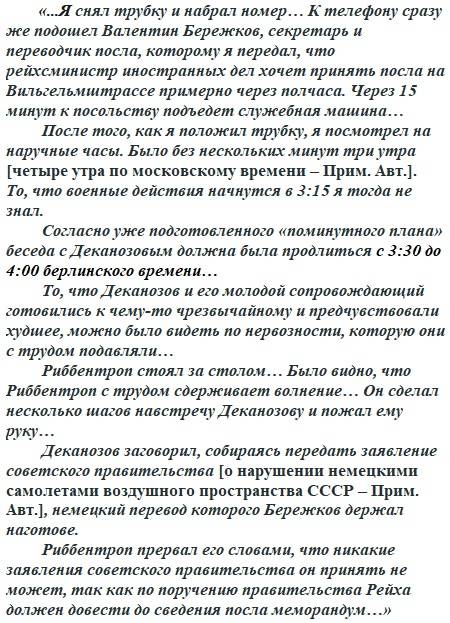
From the memoirs it is clear that our diplomats in Berlin did not know for sure that the war would begin on June 22.
Somewhere in the first hour of the night on June 22, a message to the German ambassador in Moscow and a summary of the note to the Soviet government are sent to the telegraph bureau of the German Foreign Ministry for encryption.
R. Gottlieb (Head of the Telegraph Bureau of the Ministry of Foreign Affairs of Germany):
I cannot remember whether the words "declaration of war" were used in the text, but this is what is forever imprinted in my memory: our ambassador was supposed to inform Molotov in conclusion that our troops entered the territory of the Soviet Union in the early morning hours ...
ADAP D XII / 2 contains a draft of this telegram. In addition to the memorandum, the telegram contained instructions to the ambassador:
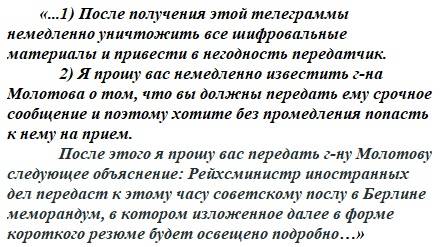
The Germans are in a hurry to destroy the ciphers, as they fear their seizure by our special services after the announcement of the invasion of the territory of the Soviet Union. This is exactly what the Gestapo and Abwehr men did when storming the USSR consulate in Paris.
M. Ktorov ("Soviet intelligence in the Great Patriotic War" Journal "National Defense" No. 11, 2020):
In the diary of the German embassy, which the intelligence officer G. Kegel cites in his book, it is said about the receipt of an encrypted telegram at 3:00 on June 22. It takes a long time to decipher a telegram of 2,5 typewritten pages using a manual cipher. Before four o'clock in the morning, even two cryptologists would not have been able to decipher the text. If one ransomware was working, then the decryption of the message could have been completed at about five o'clock in the morning.
It is possible that after the decryption of the telegram from the German embassy they tried to contact VM Molotov, but the country's leadership decided to delay the meeting until information from the military was received. There is no information about this. It may or may not be ...
G. Kegel (from the diary of the German embassy):
In the recording of the conversation the German ambassador and VM Molotov indicated that the meeting began at 5:30.
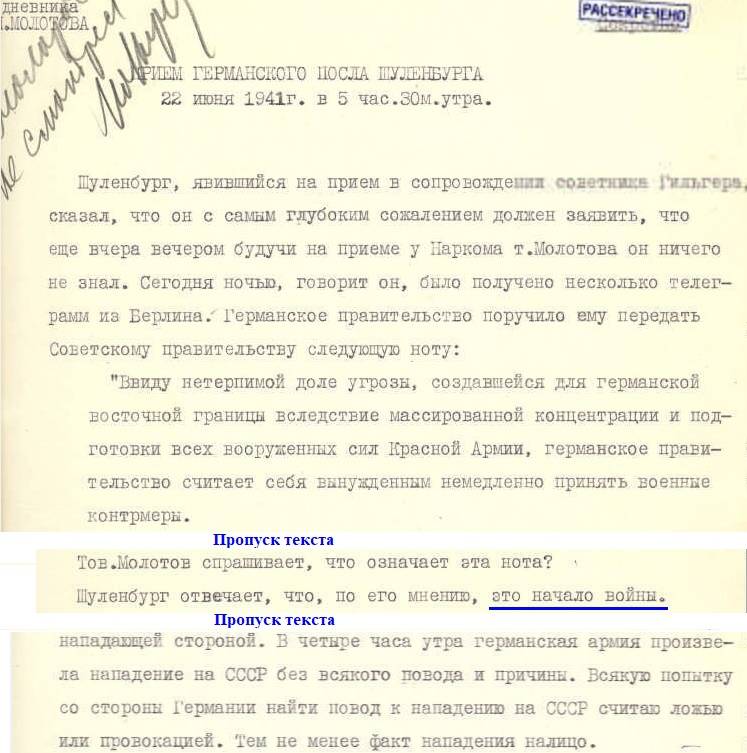
The meeting ended before 5:45 am, as Molotov enters Stalin's office at this time.
Moscow air defense zone
Magazine combat operations of the 1st Air Defense Corps:
4:30. Upon receipt of data on the violation of the border by German aircraft and the bombing of Brest-Litovsk, the units of the 1st Air Defense Corps were alerted.
5:00. The corps commander ordered to deploy 100% of the units to full combat readiness and take [anti-aircraft artillery, anti-aircraft machine guns and anti-aircraft searchlights firing positions - Approx. auth.].
The alarm is announced only after German air raids at 4:30, and at 5 o'clock an order is received to bring the corps to combat readiness. This order could only come from the commander of the Moscow Military District, General Tyulenev, to whom the Moscow air defense zone was subordinate.
Magazine combat operations of the 1st anti-aircraft searchlight regiment:
At 6:08, basically the entire command and control staff was assembled.
At 5:40 am, an order was received to mobilize the regiment according to the wartime state with the summoning of the entire enlistment staff on the orders of the BUS [Large training camps - Approx. author] using the material, weapons, fuel and other property of the emergency reserve ...
The anti-aircraft searchlight regiment is cropped and cannot fulfill its tasks without raising the assigned personnel. For example, a searchlight installation had only its commander, a sergeant. The rest of the personnel have not yet been called up.
Therefore, at 5:40 am, an order was given to raise the enrollment staff. Only someone at a sufficiently high level should have given such an order.
D. A. Zhuravlev (commander of the 1st Air Defense Corps):
Chronology of events on June 22. Early morning
The events that took place in the early morning of June 22 can only be judged by recollections, which are very contradictory.
The author will present his version of events without using the words "probably" and the like.
About 3 hours In the morning, an unknown person called to the nearest dacha (dacha in Kuntsevo).
This could not be the People's Commissar of the Navy, since the raid on Sevastopol had not yet begun.
It could not have been VM Molotov, since the German embassy had not yet called, since the text of the instructions was not yet known to the ambassador.
These could not be the leaders of the spacecraft, since they also do not know about the beginning of the war and do not believe in its beginning.
According to the author, L.P. Beria called Stalin, worried about the activation of the Germans along the entire border.
At the same time, the People's Commissar of Internal Affairs does not expect the start of the war at dawn on June 22, since he does not give an order to bring the entire personnel of the PV of the western districts to combat readiness. Therefore, part of the personnel was unexpectedly caught by enemy fire in the premises of the outposts.
As the head of the engineering service of the 4th army A.I. Prishlyakov said: “We were warned that the German military might go for provocations and that it is impossible to succumb to provocations. Nothing. There are no faint of heart in the army headquarters ... "
Demonstrating strong nerves, the leadership set up some of the servicemen of its People's Commissariat ...
Expecting German provocations at the border, Stalin is going to the Kremlin. He could have given an order to inform Molotov of his departure, or he could have given an order to Molotov to leave for the Kremlin.
В 3:17 the commander of the Black Sea Fleet calls the NGO and speaks to G.K. Zhukov in order to understand how he should deal with the unknown planes.
В 3:20 anti-aircraft guns of the Black Sea Fleet open fire on enemy aircraft. After opening fire, Admiral Oktyabrsky reports on the raid on Sevastopol to the People's Commissar of the Navy.
Stalin's driver P. Mitrokhin recalled: “In 3:30 On June 22, I gave the car to Stalin at the entrance to the dacha in Kuntsevo ... "
F. Chuev in his book "140 Conversations with Molotov" wrote that VM Molotov said about a trip from a nearby dacha to the Kremlin: "when you go from a dacha, you need 30-35 minutes."
A. T. Rybin (Stalin's security officer): “Already in four o'clock the leader came to the Kremlin. "
P.K. Ionochkin (Stalin's security officer): “LP Beria was the first to come to the Kremlin at night on 22.06.41, JV Stalin appeared after him, then the rest of the members of the Politburo of the Central Committee of the All-Union Communist Party of Bolsheviks began to arrive ...”.
The arrival of Beria first in the Kremlin indirectly indicates that he called Stalin.
About 3: 25 Admiral N. G. Kuznetsov tries to contact Stalin. Stalin prepares to leave and probably decides not to answer the phone. The guards should not inform outsiders about the departure and therefore the answer should be: "Comrade Stalin is not and where he is unknown to me".
Admiral Kuznetsov calls the People's Commissar for Defense and reports on the events in Sevastopol. It seemed to N.G. Kuznetsov that S.K. Timoshenko already knew about the raid.
According to the author, the People's Commissar of Defense simply did not believe what was said.
Further, the People's Commissar of the Navy again tries to contact Stalin, but the leader is on the way to the Kremlin.
Later, N.G. Kuznetsov was called back by Malenkov, who was informed about the call by a security officer or Poskrebyshev. Beria and Malenkov also call Admiral Oktyabrsky about the raid on Sevastopol.
For some time until four o'clock in the morning General N.N. Voronov, Chief of the Air Defense Directorate, receives information about the raid on Sevastopol. N.N. Voronov arrives at the office of the People's Commissar of Defense, in which there is also Mekhlis.
N.N. Voronov:
Without expressing any comments on my report, the People's Commissar handed me a large notebook and offered to present the report in writing.
When I was writing, Mekhlis stood behind my back and made sure that I was accurately presenting what I was saying. After I finished, Mehlis offered to subscribe.
I signed my name and was allowed to continue in my current duties ...
It seemed to me then: [People's Commissar of Defense - Approx. auth.] it was hard to believe that the war had really begun...
After NN Voronov left, Mekhlis went to check the information.
At this time, SK Timoshenko received new data. The People's Commissar of Defense asks S.M.Budyonny to call Stalin about the raid on Sevastopol.
The People's Commissar can be understood: about six hours ago, he and the chief of the General Staff probably convinced Stalin that it was impossible for the Germans to attack.
S.M. Budyonny:
I told him that it was necessary to report immediately, but he said: call you! I immediately called and reported ...
Comrade Stalin asked: Where is the people's commissar? I answered: here next to me (I was already in the office of the People's Commissar).
Comrade Stalin ordered to hand over the phone to him ...
About 4:10 the last German bomber leaves Sevastopol.
С 4:13 fighter aircraft begin patrolling over Sevastopol.
At five o'clock in the morning (probably, after 4:13) Admiral Oktyabrsky calls the chief of the General Staff and reports: “The raid was repulsed. An attempt to strike at the ships was thwarted. But there is destruction in the city ... "
In the period from 3 to 4 o'clockProbably, there are continuous calls to NGOs about the threatening situation at the border, but the KA leadership thinks that these are provocative actions.
The General Staff receives regular messages from the western VOs:
- at 4:00 - artillery fire and at the same time the raid of enemy aircraft on airfields and cities in the Baltic States;
- at 4:20 - artillery fire and at the same time a raid on Grodno and Brest. Shelling of borders in Ukraine;
- at 4:30 - raid of enemy aircraft on airfields and cities in Ukraine.
Commander of the Leningrad Military District MM Popov and a member of the Military Council NN Klementyev from the early morning of June 21 calmly ride the Polar Star train from Murmansk to Leningrad.
В 4 hours In the morning in Petrozavodsk, they are informed that, by order from Moscow, their carriage is being uncoupled from the train, attached to a separate steam locomotive, and sent to Leningrad outside the schedule.
M. M. Popov:
About 7 a.m our more than modest line-up made its first stop. The commandant who appeared in the car ... introduced himself and reported that the stop was caused by the need to check the axle boxes ...
About an hour ago it was reported over the intercom from Leningrad ... that the Germans had bombed a number of our cities in the west at about 4 o'clock in the morning ...
The ending should ...
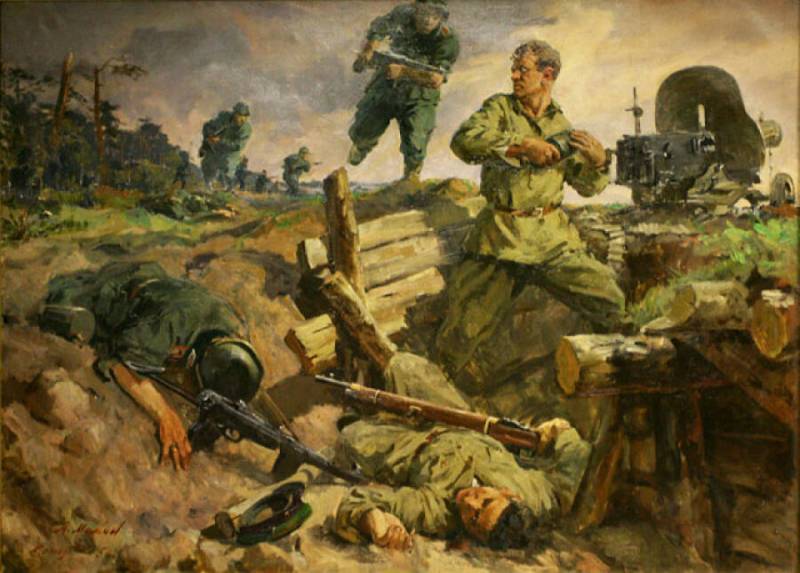
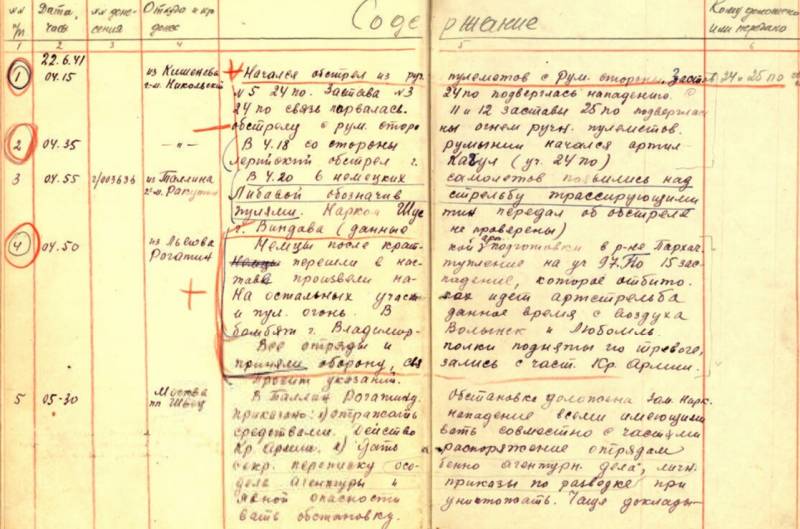
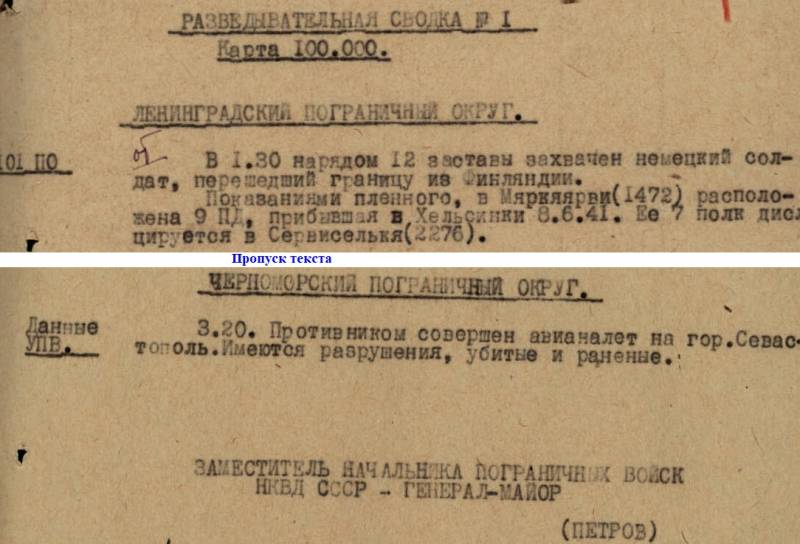
Information